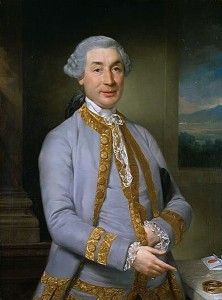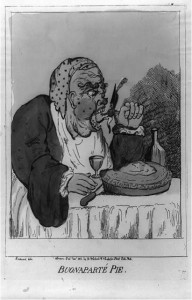 As far back as Corsican records go, Napoleon’s family signed their name “Bonaparte.” In 1759, Napoleon’s father, Carlo, in his quest to establish hereditary links to Tuscan nobility, changed to the Italian “Buonoparte” form. Ten years later, his second son, Napoleon, was born under that surname.
As far back as Corsican records go, Napoleon’s family signed their name “Bonaparte.” In 1759, Napoleon’s father, Carlo, in his quest to establish hereditary links to Tuscan nobility, changed to the Italian “Buonoparte” form. Ten years later, his second son, Napoleon, was born under that surname.
Because Carlo had succeeded in establishing the family’s noble rank, young Napoleon was accepted as an eligible student in the French king’s military school. Seventeen years later, on March 9, 1796, twenty-six-year-old Napoleon signed his name Buonaparte for the last time—on documents marrying him to Josephine Beauharnais. From that date forward he reverted to “Bonaparte,” which appeared more French. Some claim that’s when he made a final break with his Corsican roots.
In later years, British propaganda used the foreign sounding “Buonaparte” to undermine his legitimacy as a French ruler. That’s why the Englishman in this 1803 cartoon is gobbling “Buonaparté pie.” On St Helena, when the British refused to acknowledge the defeated Emperor’s imperial rights, they insisted everyone call him “General Buonaparte.”
Today, we see this same trick used in our own country when those who wish to diminish Barack Obama—a strange enough sounding name in its own right—call him “Barack Hussein Obama.” It’s in our genes to fear “the other,” but one can hope someday we’ll learn to rise above the instinct.

That is a fascinating piece of information, Margaret! I do not recall having read before that the original spelling of Napoleon’s family name was Bonaparte. What are your sources?
Pingback: Napolyon Bonapart | CubeReel
Dear Margaret Rodenberg, Excellent your work and your explanation!
I found, when I was travel to Lyon (2010), casually when looking for a metal detector, a found rare plaster proof of medals, which is written: *A* BUONAPARTE* He has his left face appearing, with long hair and ribbon. I did a lot of research until I got to you, I went through the medal ads from 1796 to 1799. When I read your text: BONAPARTE OR BUONAPARTE, I discovered than that test medal I found with the name Buonaparte is closer to 1796.
Thank you for your excellent study!
Glad that my website helped you! And how wonderful that you found a medal like that. Thanks for visiting the site.
Margaret
Hi, what is the title of your book and if you have found a publisher since your last posting where can it be bought?
Thank you for asking, Michael. I haven’t found a publisher yet so it’s not available for purchase. The working title is the same as this website’s: FINDING NAPOLEON.
All the best,
Margaret
Pingback: Finding Napoleon in London Admiral Sir George Cockburn
In Victor Hugo’s Les Miserable, Bonaparte is called “B-u-o-naparte” as an insult. Thank you for explaining as to why it was an insult.
You’re welcome, Nithin! Sadly, I guess it’s part of human nature to disparage people by pointing out that they are from another “tribe.” May we all do better!
A few years back i read another explanatory of the bonaparte surname and it was like this…on his mother side that originated from the byzantian emperors who fled from kwnstantinople and then lived in moreas ..in peloponissos Greece were allowed to leave moreas for korsika…their surname kalomeritis transferred in french is bonaparte…true or false who knows..?ty!
Are you aware that Barack Hussein Obama IS his actual name? So pointing out FACT is now disparaging? Makes one wonder about your historical objectivity and viewpoints .
Of course, I’m aware of that. And, in fact. both spellings of Napoleon’s last name are correct as well. Yet, one of them could be used as propaganda or disparagement.The truth can often be wielded as a weapon, especially when it’s taken out of its proper context.
That’s one I hadn’t heard.I’m not sure I understand it since Bonaparte came from his father’s side?